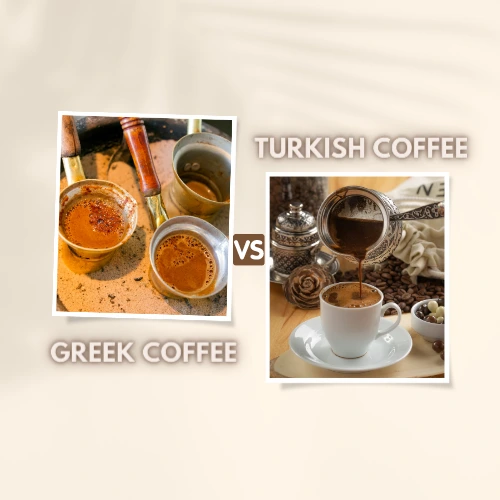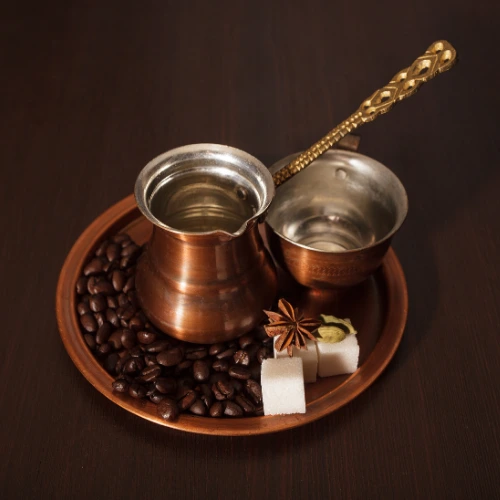Turkish coffee or Greek coffee? Let’s bring back another decades-old coffee debate that refuses to go away. If you were to walk into a café in Athens and request a cup of Greek coffee then travel to Istanbul, enter a coffee shop, and ask for Turkish coffee, the next question you would most likely ask is “Aren’t they the exact same thing? “

I’ve tasted both and that’s what I asked myself at first. Later it dawned on me that there may actually be some minor differences between these two beverages. So, I delved deeper and realized this debate started way back in the 1970s.
I’ll briefly tell you how it all began and also let you in on the other differences that distinguish these two beverages.
Greek Coffee vs Turkish Coffee: Historical Background
Coffee found its way into Europe and Asia through the Ottoman Empire. Herdsmen from Ethiopia brought it with them into Yemen, which was one of the Ottoman provinces early in the 16th century.
Not too long after that, the coffee got to Istanbul, which was the empire’s capital. Yemen’s governor introduced it to Suleiman the Magnificent in 1543. He was the sultan of the empire at the time.
The Turkish Origin
Soon after the governor brought the coffee, the empire tried to ban it because they viewed it as a drug. But it was already too popular to be controlled. The sultan would later legalize it because of its popularity.

Turkey was among the first countries to fully embrace coffee. Over time, they refined the brewing process and developed what’s popularly known as Turkish coffee.
Fun fact: In 2013, UNESCO added Turkish coffee to its list of Intangible Cultural Heritage of Humanity
Other countries that constituted the Ottoman empire, including Greece, soon embraced the Turkish technique of making coffee. Some Eastern Mediterranean and Balkan countries have laid claim to creating this Turkish brew, but that’s a debate for another day.
Here’s another interesting fact: The Turkish technique of making coffee is the world’s oldest coffee-brewing method
Until the 1970s, Greeks used to call it ‘Turkish coffee. So what happened?
The Greek Origin
Greeks were totally fine with referring to this brew as Turkish but that started to change when Turkey invaded Cyprus in 1974.
According to Greek scholars, the Greek military junta lobbied for a coup in this island, and this didn’t go down well with Turkey. It provoked them to invade Cyprus.
This invasion irked the Greeks so much that they tried to wipe out Turkey’s special place in the history of this coffee. They renamed the drink ‘Greek Coffee
And it’s not just Greece alone who’ve renamed this drink. Armenia, Bosnia, and Cyprus, just to name a few, refer to it differently for different reasons.
If you were to walk into a coffee shop anywhere in Greece and specifically ask for ‘Turkish Coffee’, this would most likely irritate the waiter. Some will politely correct you, but the bigger lesson here is that when in Rome, do as the Romans do.
Enough about the naming politics of Turkish coffee and Greek coffee. Maybe you are wondering if there are other differences between these two drinks. Let’s find out.
Other Differences Between Greek and Turkish Coffee
Overall, Turkish and Greek coffees are more similar than different. Here’s a fun fact about the two.
Turkish and Greek coffees are the only coffee brews served with grounds. And that’s not where it ends. The coffee sediments at the bottom of your cup can actually be used for coffee fortune telling. Apart from tea leaves, only these two coffees can be used to predict your future.
The few differences I came across were based on location, type of brew (both Greek and Turkish coffee have different varieties), and who was making the brew.

That’s to say the points I’m going to tell you aren’t universally accepted differences. It’s not like comparing Turkish coffee vs Espresso where differences are huge and significant. But you will want to know these small differences nonetheless just to be aware of what to expect out there.
- In Greece, the Greek coffee pot used to make this brew is commonly referred to as Briki while in Turkey, it’s popularly known as ibrik or cezve.
- If you order sweetened Greek coffee, sugar will most likely be added after brewing while in Turkey, sugar is often mixed with coffee in the pot before brewing.
Fun fact: In Turkey, brides serve salty coffee to the groom-to-be so as to judge their character. Some regions in the country, however, see it as a bride’s disinterest in the groom or marriage.
- In Turkey, this brew is more often left to foam a couple of times to make it stronger whereas in Greece, the coffee is often served right after it foams and boils over
Both Turkish and Greek coffees stay warm longer than other coffees because of their thick foam
- Greeks often serve this brew in plain white porcelain cups while Turks use both decorative and white cups.
- The typical Turkish brew is made using darker roasts while in Greece, both darker and lighter roasts are used.
Whether you choose to have Greek coffee or Turkish coffee, the bottom line is, it’s the exact same beverage but with a different name and a few other minor differences.
Curious how Turkish coffee compares to espresso? Check out our article on Turkish Coffee vs Espresso: The Battle of the Demitasse Cups
Greek Coffee vs Turkish Coffee: Conclusion
Without the events in 1974 between Turkey and Greece, we’d probably not be having this debate. Everyone in Greece was happy to use the name Turkish until the relationship between the two countries became frosty.
Unfortunately, the renaming of the Turkish brew has not been well received by a section of Turks. When Dr Oz, a celebrity physician of Turkish Origin, talked about the benefits of “Greek Coffee” a few years ago, a Turkish organization protested against his choice of words.
The politics of names aside, Greeks have incorporated a few more things into the drink’s culture such as using different cups, roast level, and pot names to make the coffee unique to their national culture. You may encounter most of these differences as you experience both beverages from different cafes and friends and tour different regions in Europe and Asia.
Just keep in mind that everyone has their own reasons for using the name Turkish coffee or Greek coffee. So, when in Rome, do as the Romans do.







